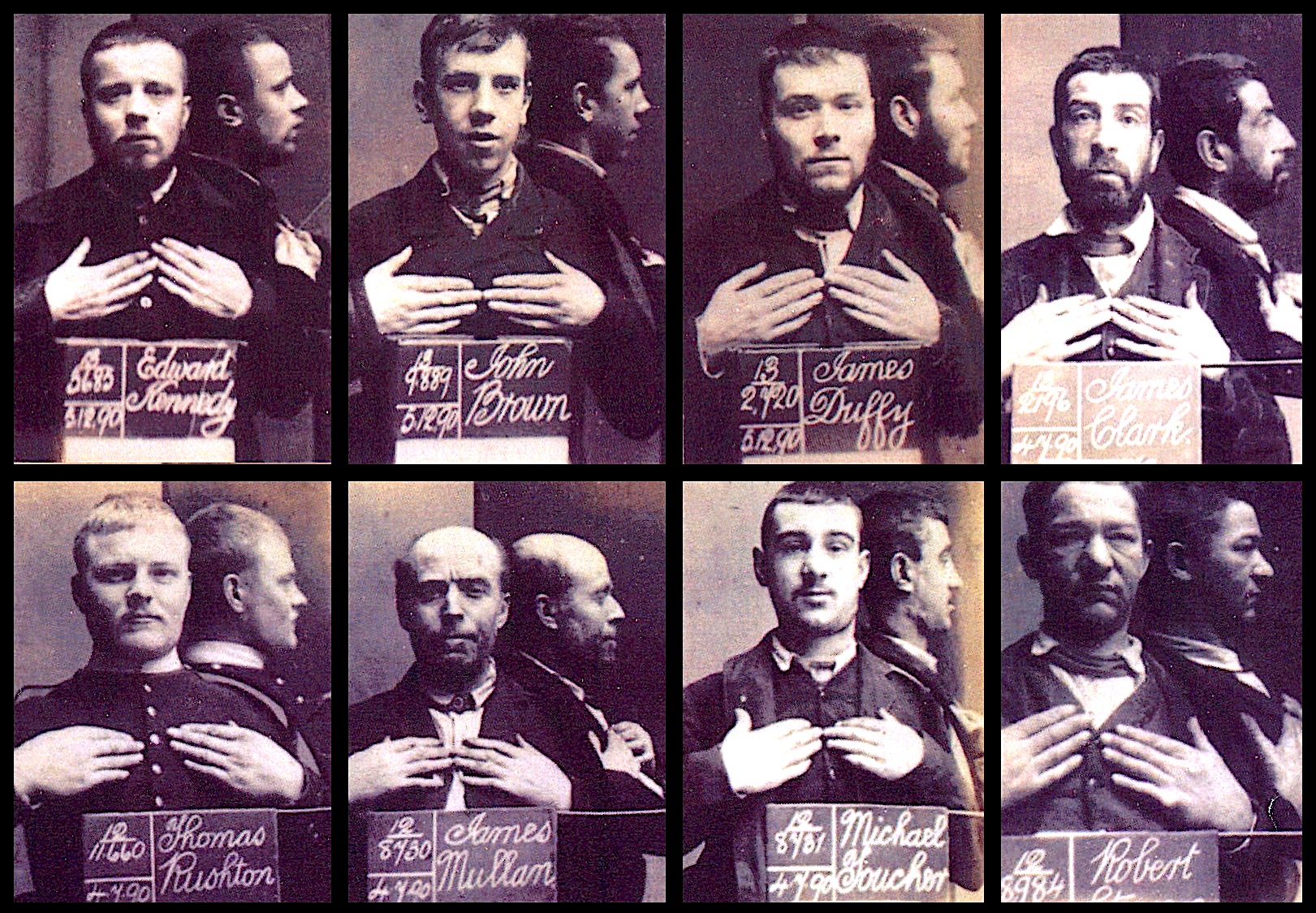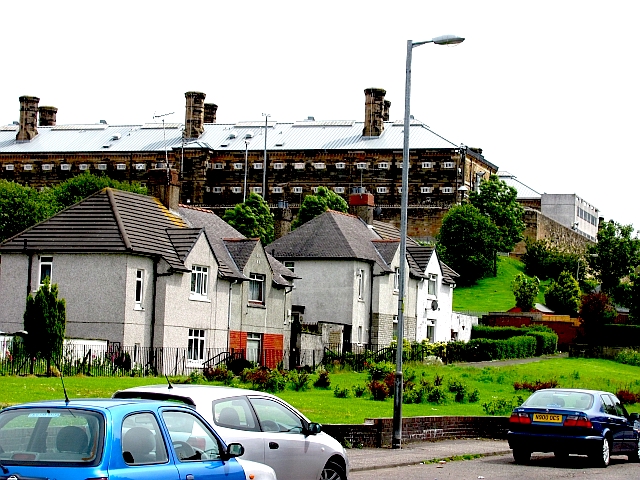Think of every sensible thing you think you know about prison. Think of education, training, rehabilitation. It is all completely ignored by the Scottish Prison Service.

(CCO)
By Craig Murray
CraigMurray.org.uk
 I was walking down that improbably long central corridor in a group of about eight mainstream prisoners heading for legal visits, when panic broke out among the escorting guards. About a hundred yards further down, and coming towards us, was an overweight and bearded old man walking with a zimmer frame [or walker] and wearing the maroon shirt of a protected prisoner.
I was walking down that improbably long central corridor in a group of about eight mainstream prisoners heading for legal visits, when panic broke out among the escorting guards. About a hundred yards further down, and coming towards us, was an overweight and bearded old man walking with a zimmer frame [or walker] and wearing the maroon shirt of a protected prisoner.
Pandemonium broke out as the prisoners I was with saw him; they yelled, screamed and made barking noises. A couple made as though to break from the guards and run down the corridor to attack him, but they stopped after only a few yards and hurled abuse. One of them shouted “you bloody foster carer!” It seemed a strange term of abuse, but it was for me a moment of epiphany.
Putting that together with a couple of conversations I had heard in the dinner queue and exercise yard, I suddenly realized that the reason sexual offenders are so hated in jail is that a high proportion of the prisoners, coming from whole lives of various forms of state institutionalization, had been victims of child sexual abuse themselves. As I realized it, so much that I had witnessed became less confusing, and I understood the community I found myself in with a new clarity.
A couple of months later I had the opportunity to discuss this revelation with the prison psychiatrist and he confirmed to me that a high proportion of prisoners were indeed childhood sexual abuse victims.
I also took the opportunity of testing this insight on a couple of prisoners with whom I had become friendly and who I judged would not react badly to the subject. Both confirmed the truth of it, and one welled with tears. It is, he said, one of those things everyone in jail knows but nobody says and I would be well advised to follow that while in Saughton, and not raise it with anybody else.
Life in the Crosshairs
The truth is that most of the prisoners have been in the crosshairs of the state for their entire lives. Almost all were born into poverty, frequently born into addiction, had been the subject of care worker supervision since infancy, had troubled and sometimes infrequent schooling, and very often had transitioned from care worker to foster or care home, to young offenders’ institution, to jail. Almost all had acquired substance addictions from childhood.
Institutionalization was their life, with brief respites back in close knit urban communities, where the state is seen as a threat as much as a helper.
Once you have been jailed once or twice, judges impose jail sentences for the most trivial of offences. About a quarter of the people I met in Saughton were there for breach of bail conditions. Many others were there for shoplifting, petty burglary or lowest level drug dealing, largely to feed their own addiction.
Think of every sensible thing you think you know about prison. Think of education, training, rehabilitation. It is all completely ignored by the Scottish Prison Service. I am telling you I saw none of it at all in Saughton jail. Nothing, zilch.
Unnecessary Security & Discomfort
What I saw was levels of security and cruel and harsh conditions that differ little from Victorian times, apart from the plumbing. All prisoners are subjected to utterly unnecessary levels of security and physical discomfort.

Mugshots of prisoners in Glasgow’s Barlinnie jail, each taken on the day of their release in 1890. (angus mcdiarmid, Flickr,CC BY-NC 2.0)
In the cell block next to mine was kept Peter Tobin, Scotland’s most notorious serial killer, repeat sexual abuser and murderer of little girls. He was kept in precisely the same conditions and security levels as the shoplifter and the seller of little packets of cannabis. Peter Tobin was held in exactly the same conditions as me, a journalist in jail as a civil prisoner.
[Related: Murray Sentenced to 8 Months in Prison]
The conditions of Peter Tobin may be appropriate to a mass murderer — locked in a tiny barred cell for 23 hours a day, never allowed anywhere unescorted, held behind multiple walls and razor-wired fences, with eight locked and guarded gates and metal doors between him and freedom. That is very harsh, but not unreasonable for a dangerous mass murderer.
But why is a shoplifter locked in a tiny barred cell for 23 hours a day, never allowed anywhere unescorted, held behind multiple walls and razor wired fences, with eight locked and guarded gates and metal doors between him and freedom?
That is barbaric, an utterly, ludicrously harsh level of punishment. It is perpetrated upon “criminals” who are in reality often amongst the most vulnerable people in society, who come from extreme poverty and deprivation, who the police and justice system treat with scarce respect for their rights or their dignity.
The large majority of prisoners I met were people needing treatment for addiction and mental health conditions, and needing an alleviation of extreme poverty and lack of education. Instead, society finds it easier to lock people up and forget about them.
In prison they are subject to constant humiliation and denigration; they are infantilized and deprived of self-worth. How this is supposed to improve society I could not in any way tell. There was not one single person in jail that I met who I felt needed or deserved the level of brutal security provided.
“Society finds it easier to lock people up and forget about them.”
People who have never been a physical threat of assault to anybody are held in conditions that would be viewed as barbaric and unenlightened for that class of prisoner by almost any other European state.
I, a journalist and civil prisoner, was locked in a tiny barred cell for 23 hours a day, never allowed anywhere unescorted, held behind multiple walls and razor wired fences, with eight locked and guarded gates and metal doors between me and the outside world.
What was the point of that level of security? I remember on day one, as I plodded around the exercise yard, ankle deep in sloppy rubbish, with four guards supervising just me, I was thinking that in time, once they have done their threat assessments, this will alleviate. It did, in that later I only had two guards supervising me plodding around the yard.
The truth of the matter is that Scotland, with a single small exception, has no other kind of prison than what are, in truth, maximum security prisons in all but name. A number of smaller and less harsh institutions have been deliberately closed down over the past eight years as Scotland concentrates on large, vastly overcrowded, mega prisons.

Barlinnie Prison looming over Lethamhill Road in Glasgow, 2011.
(Richard Webb, CC BY-SA 2.0)
The only vaguely amusing thing about this is that the Scottish Prison Service makes it a boast that now “all prisoners are treated equally.” As though treating poor shoplifters as though they are Peter Tobin is a proud, democratic thing rather than a prime example of callous, unimaginative, bureaucratic stupidity, combined with cruelty.
The 8-foot-by-12 cells in Saughton are all designed as single cells. Over 90 percent have two people crammed into them. That is the extent of overcrowding. This is a product, not of high crime rates, but of a completely unimaginative and brutal justice system that resorts to imprisonment far too readily.
It is also, of course, a result of the failed policy of the “War on drugs” and the attempt to fight addiction through criminalization. You see the results of that failed policy in Scotland’s high drug deaths and in the misery on the streets of our cities. You also see it in the overcrowded jails.
Remand Prisoners
One third of the people suffering from this extreme regime in Saughton have not been convicted of anything. They are remand prisoners awaiting trial. The average remand prisoner currently spends 11 months in jail before being tried – against a maximum “target” of eight months. Some spend much longer. One prisoner in Saughton had been on remand for over three years.
If you have previous convictions, you will almost certainly be held on remand, no matter how trivial your current alleged offence.
One prisoner I got to know had committed the following offence: He had been extremely drunk with his friends in a pub one afternoon, a regular situation for them. He had brought a £25 round using his friend’s contactless card. He believed his friend had asked him to as it was his round. The friend disagreed. There followed an argument, and a bit of a scuffle. Nobody was hurt.

Scottish Prison Service’s CEO building in Edinburgh. (SPS)
The police were called, he was arrested and charged with several counts of violent disorder. He was in Saughton for 11 months on remand. At the end of 11 months, at trial, he was found guilty of some kind of minor affray and fined £75. After 11 months in prison. Think of that.
You see, nobody does think of that. He was one of Edinburgh’s under class, and nobody cares.
The prisoner with whom I became most friendly was charged with kidnapping and assorted other offences. He was one of the few non-addicts in the jail, but his girlfriend was an addict. There had been a row where he bundled her into his car to drive her away from her drug dealer. A friend of hers, also addicted, had reported this to police and he found himself charged with kidnapping.
He was in jail for over a year on remand before being found not guilty by the jury at trial. He is an entirely respectable member of society. He too had been held in the same security conditions as a mass murderer.
Another prisoner I got to know, only by conversations through his cell window, had been on remand for over 15 months and still had no trial date. He was in jail for breaching an order against seeing his children. He claimed — and I believe him — that he simply met them by accident when taking his everyday route home from work. There is no accusation he did anything wrong when he saw them, other than pick up his infant daughter for a brief hug.
“He was one of Edinburgh’s under class, and nobody cares.”
The problem with jailing people for domestic abuse is that they are simply locked away; nothing is done to alter their behavior. In fact, the opposite is true. They are put into an environment where their behavior is reinforced, even approved. While perpetrators of sexual violence are universally loathed, perpetrators of non-sexual domestic violence are much sympathized with by fellow prisoners and viewed as victims of undue police interference.
One direct quote I can give you, overheard in the exercise yard from a prisoner explaining his case to a small knot of others, was “I gave her a slap, as anybody would.” This brought grunts and nods of agreement.
Domestic Abuse
Why society thinks it is helpful to put domestic abusers into this prison community I fail to understand. There was no concerted effort that I could perceive to tackle these attitudes. There were no classes, no meetings with victims of domestic abuse, no attempts to explain why it is wrong or to make the prisoner think differently about the role of women in society and in his own life.
Eventually the prisoner is released back into society, with his views reinforced plus an added, much stronger, layer of resentment against women for having put him inside.
Simple imprisonment is completely counter-productive as a means of tackling violence against women. There is no education on equal rights; there is no meeting with victims to understand the impact on them; there are no seminars teaching the effect of domestic abuse on the children. There is simply nothing to correct the behavior. After the embittering experience of harsh prison, they are simply let out. Then the justice system feigns alarm that they do it again.

Debating chamber of Scottish Parliament. (Colin, CC BY-SA 4.0, Wikimedia Commons)
The Scottish Parliament has not intended that prison conditions in Scotland should be as hard as they are. The Prison Rules approved by parliament contain much that is good provision for prisoners’ rights. Yet almost every single provision in the rules that assists prisoners has been systematically and deliberately negated by the Scottish Prison Service, drawing on the sweeping powers given to governors to ignore the rules on security grounds.
The comprehensive extent of this denial of rights is truly astonishing. I shall elaborate on that in my next episode.
I am aware it has taken six months to produce this instalment. The truth is that I find the subject very emotionally disturbing, not because of what happened to me, but because of those I left as all those gates and metal doors slammed shut again behind me. I was finally shamed into producing this by an ex-prisoner I met at the Eden Festival.
He told me that there are many people inside jail who had been waiting for me to expose these abuses, and that I had a moral duty to speak on behalf of those who had no ability to express these things themselves, or occupied a place in society where nobody listened. I am grateful to him for the reminder.
If you have not read it, you can find the first part of my prison experience written up here.
Craig Murray is an author, broadcaster and human rights activist. He was British ambassador to Uzbekistan from August 2002 to October 2004 and rector of the University of Dundee from 2007 to 2010. His coverage is entirely dependent on reader support. Subscriptions to keep this blog going are gratefully received.
This article is from CraigMurray.org.uk.
The views expressed are solely those of the author and may or may not reflect those of Consortium News.

I agree with you Jean but as a lawyer in Australia my observation that there is a preponderance of Scottish, Irish and Pommy prison warders. Why? I don’t know! However there may be a connection with their deprived upbringing. Prior to doing law I served 6 years in the R.A.A.F and the majority of the service police were Poms and Scotts.
They love authority and once they have it they enjoy using it.
“a high proportion of the prisoners, coming from whole lives of various forms of state institutionalization, had been victims of child sexual abuse themselves.”
Fifty years ago, where I grew up in England, institutionalised kids all knew about the paedophiles in charge, but who would listen? To this day, the word ‘professional’ makes me want to puke – if they weren’t at it themselves, the ‘professionals’ would cover for their colleagues that were, claiming to believe a fellow ‘professional’ would never do such things, and kids must be deluded or lying if they reported such abuse. Needless to say, most kids just kept their mouths shut. (I was never institutionalised myself, but I came very close a couple of times, and knew plenty of kids who were.)
Like torture, the main purpose of prison is to intimidate the population into obedience. “Failure To Obey” is what prisoners are guilty of. In the US, “Failure To Obey” is the usual reason for murder by police. Modern society is organized around issuing orders and demanding instant compliance, just as it was in the era of chattel slavery.
But we do have one remaining right: The Right To Obey. And anyone who fails to exercise their Right To Obey will receive their just desserts.
I am so grateful for this account of the conditions in a prison, written by Craig Murray. It is the little details that count. Please keep it up.
Such was the alarm on reading this; I could not bring myself to click on your initial report on prison life.
Mr. Murray’s states “The Prison Rules approved by parliament contain much that is good provision for prisoners’ rights. Yet almost every single provision in the rules that assists prisoners has been systematically and deliberately negated by the Scottish Prison Service, drawing on the sweeping powers given to governors to ignore the rules on security grounds.”
When I read this I thought immediately of Patrick Lawrence’s most recent post on getting kicked off Twitter (at SheerPost). “This is a bureaucratic device that dates to imperial China, when mandarins wrote plenty of laws, all phrased such that they could be interpreted however it suited the court on a given occasion. The point was to preserve maximum prerogative and maximum control as laws were imposed upon imperial subjects.”
Our injustice system in the USA is every bit as evil as what is being perpetrated in the UK–the un-convicted Joshua Schulte in solitary confinement being but one horrific example.
He told me that there are many people inside jail who had been waiting for me to expose these abuses, and that I had a moral duty to speak on behalf of those who had no ability to express these things themselves, or occupied a place in society where nobody listened. I am grateful to him for the reminder.
This former resident of HMP Barlinnie and Edinburgh concurs with these descriptions of the dismal environments and the sheer hopelessness they are designed to produce in men who were already near the bottom of society’s hierarchy. However, it is difficult not to see Mr Murray’s own sense of entitlement and his outrage at being locked up with those he designates as deserving of the harshest punishments, such as those convicted of sexual violence. That latter attitude permeates every prison in the world and is used to justify hideous violence by prison guards and other prisoners. I suggest that Mr Murray look to the work of abolitionists such as Ruth Wilson Gilmore, Mariame Kaba and Angela Davis.
I am really not quite sure how you can take that from what I wrote. The only individual of whom I state that the prison conditions might be justified is a pedophile serial killer.
The conditions are plainly unnecessarily extreme for minor offenders like petty thieves, bail breakers and low level drug dealers who were the large majority of the people I met, and that is what I tackle.
How violent sexual offenders might best be treated is way beyond my expertise, but nothing I wrote endorses the current inhumane and ineffective regime.
Agree completely. The only good way to deal with crime is to prevent it, and to rehabilitate, in a non-punitive way, those who have wronged others. Harsh punishment does nothing except create more crime.
Craig, I admire and respect you. Put aside your shame and recover your voice. Write frequently.
Government of the oligarchs, by the oligarchs, and for the oligarchs.